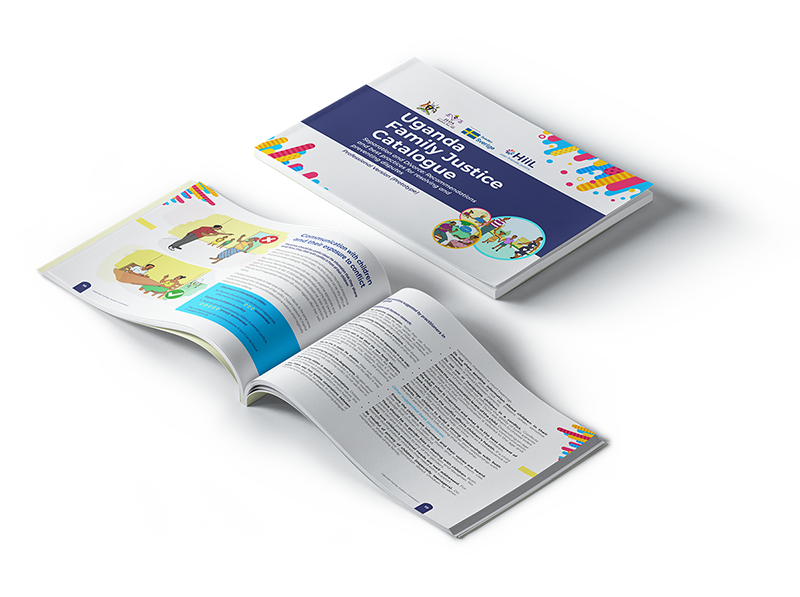A guideline focused on family issues
The Uganda Family Justice Catalogue presents a solution guideline that combines identifiable best practices based on evidence about what works. It provides actionable ways for users and professionals to reach solutions of resolving family problems. Research shows that these problems have increasingly become a key concern especially for poor and marginalised persons. In many instances, land disputes are often at the centre of these problems leading to occasions of violence, assaults and murder. This interplay has a direct impact on the livelihood of those affected.
Uganda Family Justice Catalogue ekuwa okulungamizibwa ku ngeri z’okungonjoola mu
ensonga okujjude enkola ezagezesebwa n’ezikola. Okulungamizibwa kuno kuwa
abasomi n’abakugu engeri ezikwatikako mu kusobola okugonjoola ebizibu mumaka.
Okunoonyereza kulaga nti ebizibu bino byeyongedde nnyo okweralikiriza naddala
abaavu wamu n.abo abalekebwa emabega. Emirundi mingi ebizibu bino byetoolorera
nnyo kunkayanna z’ettaka omuva obutabanguko, okusowagana n’okuttangana. Eno
embera ekkosa nnyo eby’enfuna by’abo ababa bakomedwako.
Data on family justice
The Justice Needs and Satisfaction Survey conducted by the Hague Institute for Innovation of Law (HiiL) in 2015 showed that many prevalent justice problems in Uganda were related to families. Almost 40% of the population declared having experienced a family justice problem in the previous four years. 28% of the female respondents declared to have a family problem, compared to just 10% of their male counterparts. The study further indicated that domestic violence poses a huge problem, especially for women who are almost three times more likely than men to suffer from its proliferation. Family issues were also reported to arise with higher frequency among young people. It is estimated that in a four year period between 4.6 and 4.8 million family problems occur in Uganda. Unfortunately, both the families and practitioners often lack access to effective tools to help them reach agreements when these conflicts arise.
The Justice Needs and Satisfaction Survey okunoonyereza okwakolebwa ettendekero lya
Hague Institute of Law (HIiL) mu mwaka gwa nkumi bbiri mu kumi na taano (2015)
kwalaga nti ebizibu ebyobwenkanya ebisinga obungi mu Uganda byekuusa ku maka.
Kumpi ebitundu anna kubuli kikumi (40%) eby’abantu baagamba nti baali bafunye
ekizibu ekyekuusa ku bwenkanya mu maka mu myaka enna egyiyise. Ebitundu abiri
mumunaana kubuli kikumi (28%) eby’abakyala abaddamu ebibuuzo baagamba nti
baali balina ekizibu mu maka, bwogerageranya ne banabwe abassajja abaali ebitundu
kkumi kubuli kikuumi (10%) byokka. Okunonyereza era kwayongera nekulaga nti
obutabanguko mu maka kizibu ky’amanyi nnyo, okusingira ddala eri abakyala
abasuubirwa okubonabona emirundi egyekubisidwamu ng’essatu okusinga kubassajja.
Access to justice for the vulnerable
There is a need for innovative solutions to address many day-to-day problems that arise in communities. Such solutions should particularly enhance access to justice services for vulnerable persons. The focus in this new direction has been reiterated by the 4th Strategic Development Plan of the Justice Law and Order Sector (JLOS) so as to remove bottlenecks in delivery and access to JLOS services in line with the National Development Plan II and the Vision 2040. It recognises that the peoples’ needs and expectations of the justice system are also closely intertwined with their livelihood opportunities. They seek for appropriate tools and services to deliver user friendly justice as well as alternative remedies to conventional solutions.
Waliwo obwetaavu bw’okufuna engeri ez’omulembe ezinakozesebwa mu kugonjoola
ensonga enyingi ezibalukawo buli lunaku eyo abantu gyebabera ne gyebakolera.
Engeri zino zirina okuteekawo embeera esobozesa abantu abakoseddwa okufuna
obwenkanya. Omulamwa gw’enkola eno empya gudibbwamu emirundi mingi okuyita
mu nteekateeka ey’enkulakulana ey’okuna eya Justice Law and Order Sector (JLOS)
okusobola okugyawo ebiziyiza enkola y’emirimu n’okufuna obuyambi okuva mu
kitongole kya JLOS okusinzira Kunteekateeka y’enkulakulana ly’eggwanga ey’okubiri n’okwolesebwa bbiri anna. Enkola eno etegeera nti ebyetaago by’abantu ne
byebasuubira mu nkola ey’obwenkanya bikwatagana nnyo n’emikisa gy’embeera
zaabwe.
Who could benefit?
Most family justice is provided by people relying primarily on their own experiences and those in the group where they live such as peers in their social network, volunteers, Local Council Courts and elders or leaders in the village. To help people more effectively, they might be interested in knowing what works best in mediation, negotiation and decision-making processes. Police, courts and other organizations already use guidelines for handling issues such as domestic violence.
The catalogue will be continually updated with recommendations for improved diagnosis and management of family justice problems. Such a living guidelines model will enable both service providers and users to make informed decisions.
Ekigendererwa kwe kufuna ebikozesebwa ebyetaagisa n’enkola ezinakozesebwa
okutuusa obwenkanya eri abantu awamu n’okutereezaamu ku ngeri z’okugonjoola mu
ensonga ezimanyikiddwa.
Ensonga z’obwenkanya mu maka emirundi mingi abantu abazikolako basinzira ku
byebayisuemu nga bbo awamu n’abo bebabeera nabo okugeza nga ab’emyaka
gyabwe, banakyewa, amakkooti g’omu bitundu gyebabeera wamu n’abakadde oba
abakulembezze ku byalo. Okusobola okuyambira ddala abantu, bayinza okubeera nga
banoonya ki ekyisinga okukola mu ngeri z’okutabaganya, okutesaganya n’okukola
okusalawo. Polisi, kkooti n’ebitongole ebirala byatandiika dda okozesa
okulungamizzibwa kuno ngabikola ku nsonga okugeza ng’ezikwatta ku kukubagana mu
maka.
Ekitabo kino kigya kudibwangamu emirundi n’emirundi nga bwekyongerwamu
okulungamizibwa ku kwekkenenya n’okukwasaganya ebizibu by’obwenkanya mumaka
okulongoosedwamu. Enkola erungamya ate ng’erikumulamwa bweti egyakuyamba
abakozi b’emirimu n’abetaaga obuyambi okusobola okusalawo byebategera.

